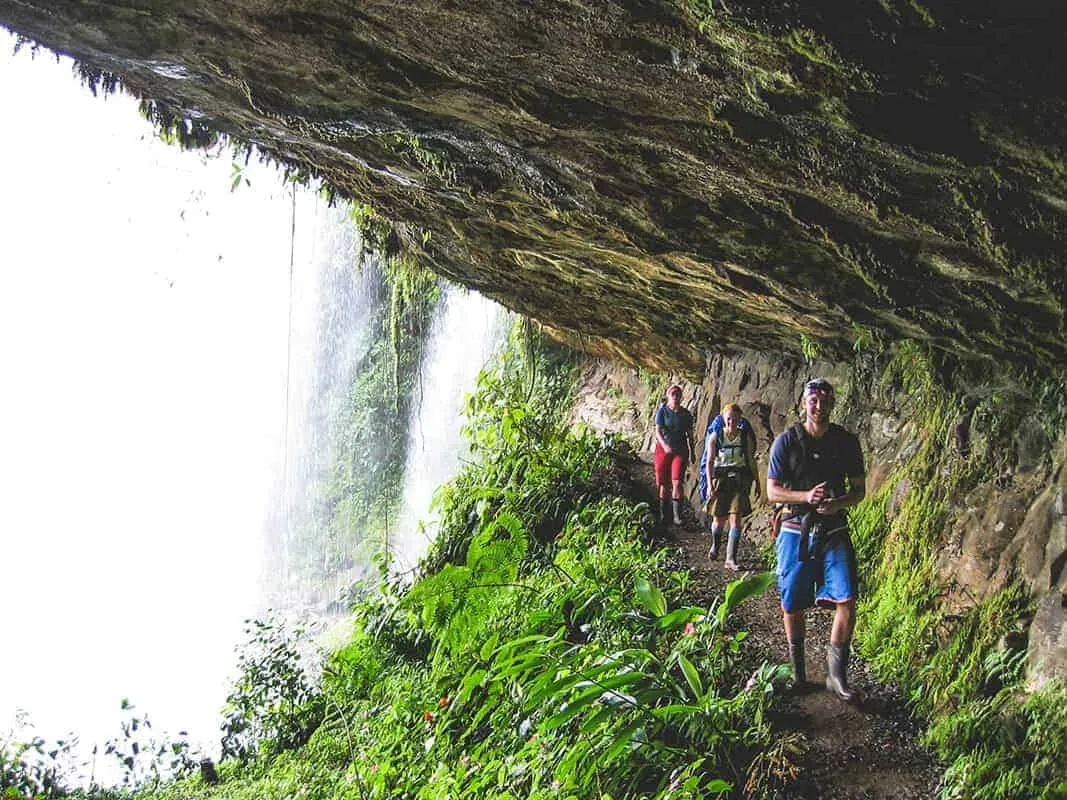Discover the transformative power of hiking for mental health and learn how nature's therapeutic trails can reduce stress, combat depression, and enhance your overall wellbeing. From scientific research to practical gear recommendations, this comprehensive guide from Nature Guests will help you harness the healing power of the great outdoors for lasting mental wellness.
The Science Behind Hiking for Mental Health
Research consistently demonstrates that hiking for mental health provides measurable benefits backed by scientific evidence. Stanford University researchers found that a 90-minute walk in nature significantly reduced activity in the brain's subgenual prefrontal cortex, an area associated with depression and anxiety. This groundbreaking study published in Proceedings of the National Academy of Sciences provides concrete evidence that nature-based activities like hiking directly impact brain function.
The neurological benefits of hiking for mental health extend beyond simple stress reduction. When we immerse ourselves in natural environments, our brains produce increased levels of serotonin and dopamine—neurotransmitters crucial for mood regulation and emotional wellbeing. Additionally, exposure to natural phytoncides (organic compounds released by trees) has been shown to boost immune system function and reduce cortisol levels, creating a cascade of positive physiological effects.

Nature-based therapy sessions demonstrate the practical application of hiking for mental health treatment.
Japanese researchers have extensively studied "forest bathing" or shinrin-yoku, revealing that spending time in forested environments while hiking significantly reduces stress hormones by up to 28% after just 30 minutes. These findings align with growing evidence that hiking for mental health serves as a powerful, accessible intervention for various psychological conditions including anxiety, depression, and ADHD.
Key Scientific Findings
- 50% improvement in creative problem-solving after nature exposure
- 28% reduction in cortisol levels after 30 minutes of forest hiking
- Significant decrease in rumination patterns associated with depression
- Enhanced natural killer cell activity supporting immune function
The therapeutic effects of hiking for mental health are particularly pronounced when combined with mindfulness practices. Studies show that mindful hiking—paying deliberate attention to natural surroundings, breathing patterns, and bodily sensations—amplifies the mental health benefits exponentially. This practice helps interrupt negative thought cycles while fostering present-moment awareness essential for psychological wellbeing. If you're interested in expanding your outdoor activities, consider exploring our guide on hiking for weight loss to complement your mental health journey.
Physical Benefits That Support Mental Wellbeing
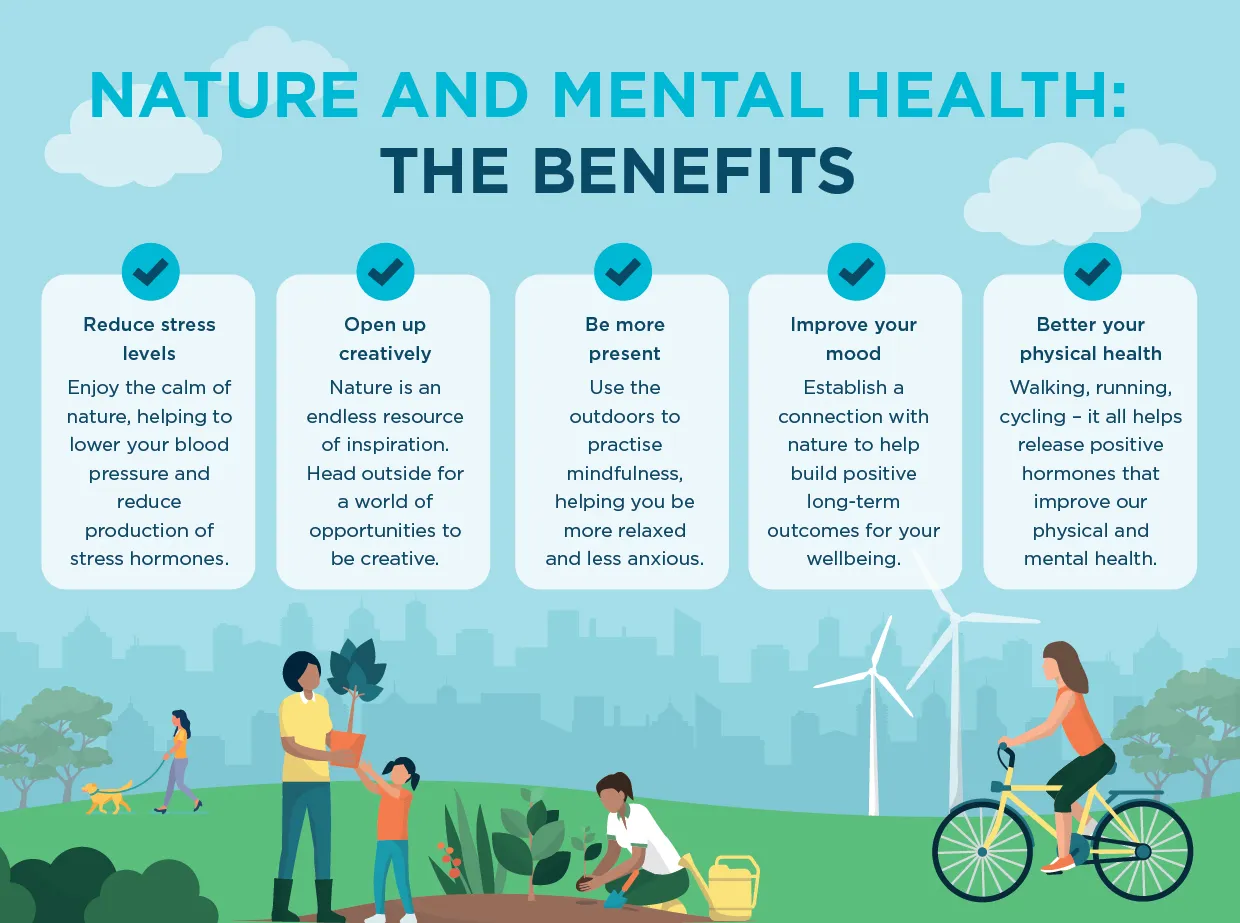
Comprehensive overview of nature's impact on mental wellness through activities like hiking.
The physical aspects of hiking for mental health create a foundation for psychological wellness through multiple interconnected mechanisms. Regular hiking improves cardiovascular health, which directly impacts brain function by increasing blood flow and oxygen delivery to neural tissues. This enhanced circulation supports neuroplasticity—the brain's ability to form new neural connections essential for recovery from mental health challenges.
Exercise-induced endorphin release during hiking creates natural mood elevation that can last for hours after completion. These "feel-good" chemicals act as natural antidepressants, providing relief comparable to pharmaceutical interventions in some cases. Additionally, the rhythmic nature of walking activates the parasympathetic nervous system, promoting relaxation and stress recovery. For those dealing with chronic stress, our article on hiking to reduce stress offers specific techniques for maximizing these benefits.
The physical challenge of terrain navigation during hiking for mental health engages proprioception and spatial awareness, functions that stimulate cognitive processing and executive function. This mental engagement provides natural distraction from ruminating thoughts while building confidence through achievement of physical goals. Research indicates that outdoor exercise burns up to four times more calories than indoor alternatives, contributing to better sleep quality and energy regulation—both crucial factors in maintaining mental health stability.
Important Considerations
While hiking offers tremendous benefits, it's important to start gradually and listen to your body. If you're wondering is hiking hard, remember that trails exist for every fitness level, and the mental health benefits begin with even gentle nature walks.
Vitamin D synthesis from natural sunlight exposure during hiking supports serotonin production and circadian rhythm regulation. This is particularly beneficial for individuals experiencing seasonal affective disorder or general mood disruptions. The combined effect of physical exertion, natural light exposure, and fresh air creates an optimal environment for mental health recovery and maintenance.
Proven Mental Health Benefits of Trail Therapy
UNC Health explores the comprehensive mental health benefits of spending time outdoors and hiking.
The mental health benefits of hiking for mental health encompass a broad spectrum of psychological improvements documented through extensive clinical research. Studies consistently show that individuals who engage in regular hiking experience significant reductions in symptoms of anxiety, depression, and stress-related disorders. The American Psychological Association has recognized nature-based interventions as effective adjunct treatments for various mental health conditions.
Anxiety Reduction
Natural environments activate the parasympathetic nervous system, reducing anxiety symptoms by up to 68% in regular hikers according to environmental psychology studies.
Depression Relief
Hiking increases serotonin and dopamine production while providing sense of accomplishment and purpose, leading to measurable improvements in depressive symptoms.
Cognitive Enhancement
Regular hiking improves attention span, memory function, and executive decision-making capabilities through increased BDNF (brain-derived neurotrophic factor) production.
Sleep Quality
Physical exertion combined with natural light exposure regulates circadian rhythms, leading to deeper, more restorative sleep patterns essential for mental health recovery.
Research from the University of Michigan demonstrates that hiking for mental health significantly improves attention restoration and reduces mental fatigue. Participants showed marked improvements in directed attention capabilities after spending time in natural environments compared to urban settings. This finding is particularly relevant for individuals with ADHD or attention-related challenges, as hiking provides a non-pharmaceutical intervention for improving focus and concentration.
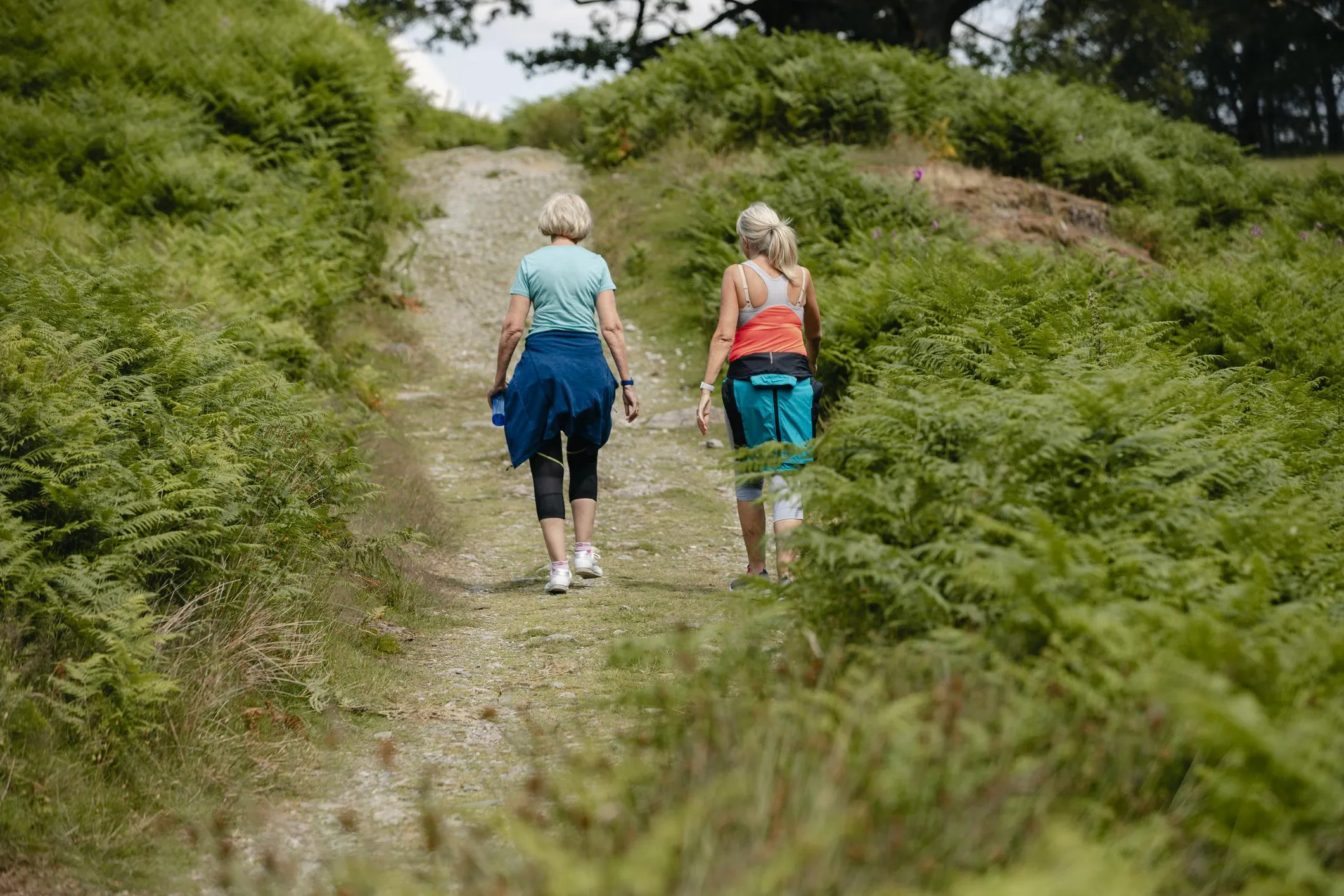
Outdoor therapy sessions demonstrate the practical application of hiking for mental health in therapeutic settings.
The social aspects of group hiking contribute significantly to mental health improvement through community connection and shared experiences. Social isolation often exacerbates mental health conditions, making the communal nature of hiking clubs and group trails particularly therapeutic. Building relationships through shared outdoor experiences creates support networks essential for long-term mental wellness. For those tracking their physical progress alongside mental health improvements, understanding how many calories burned hiking can provide additional motivation and measurable goals.
Forest environments provide unique therapeutic benefits through exposure to negative ions—electrically charged particles abundant near waterfalls, streams, and dense vegetation. These negative ions have been shown to increase serotonin levels, creating natural mood elevation and energy enhancement. This phenomenon explains why many individuals report feeling particularly rejuvenated after hikes near water sources or in humid forest environments.
Essential Gear for Your Mental Health Hiking Journey
Proper equipment enhances the therapeutic benefits of hiking for mental health by ensuring comfort, safety, and confidence on the trails. Quality gear removes barriers to enjoying nature's healing effects and allows you to focus on the mental health benefits rather than equipment concerns. Here are essential items that will enhance your therapeutic hiking experience:

Quality Hiking Boots
Proper footwear is crucial for safe and comfortable hiking experiences. Waterproof, lightweight boots provide stability and protection while maintaining comfort during long therapeutic walks.

Comfortable Hiking Backpack
A well-fitted backpack allows you to carry water, snacks, and mindfulness tools comfortably. Look for features like hydration compatibility and multiple compartments for organization.
Natural Stress Support
Complement your hiking routine with natural stress relief supplements like ashwagandha to enhance the mental health benefits of your outdoor adventures.
Mental Wellness Journal
Document your hiking experiences and mental health progress with a dedicated wellness journal. Track mood improvements, insights, and favorite trail discoveries.
Pro Tips for Mental Health Hiking
- Choose trails that match your fitness level to avoid unnecessary stress
- Bring a mindfulness app or meditation guide for trail breaks
- Pack healthy snacks to maintain stable blood sugar and mood
- Consider hiking poles for stability and upper body engagement
- Always inform someone of your hiking plans for safety
Additional considerations for hiking for mental health include weather-appropriate clothing, sun protection, and emergency supplies. Layer systems allow for temperature regulation throughout your hike, preventing discomfort that could diminish the therapeutic benefits. A basic first aid kit provides peace of mind, allowing you to focus on the mental health aspects of your journey rather than safety concerns.
Getting Started: Your Path to Mental Wellness Through Hiking
Beginning your journey with hiking for mental health requires thoughtful planning and realistic expectations. The key to success lies in starting gradually and building confidence through achievable goals. Remember, the therapeutic benefits begin immediately—even a 20-minute nature walk can provide measurable mental health improvements.
Choosing Your First Trails
Select beginner-friendly trails that offer natural beauty without overwhelming physical demands. Local parks, nature preserves, and rail-trails provide excellent starting points for hiking for mental health. Research trail lengths, elevation gains, and terrain difficulty using apps like AllTrails or local park websites. Start with distances under 2 miles and minimal elevation change to build confidence and assess your fitness level.
Morning hikes often provide optimal conditions for mental health benefits due to cooler temperatures, fewer crowds, and enhanced natural lighting. Early hiking also establishes positive daily routines that support overall mental wellness. Consider midweek hiking when possible to maximize solitude and natural immersion.
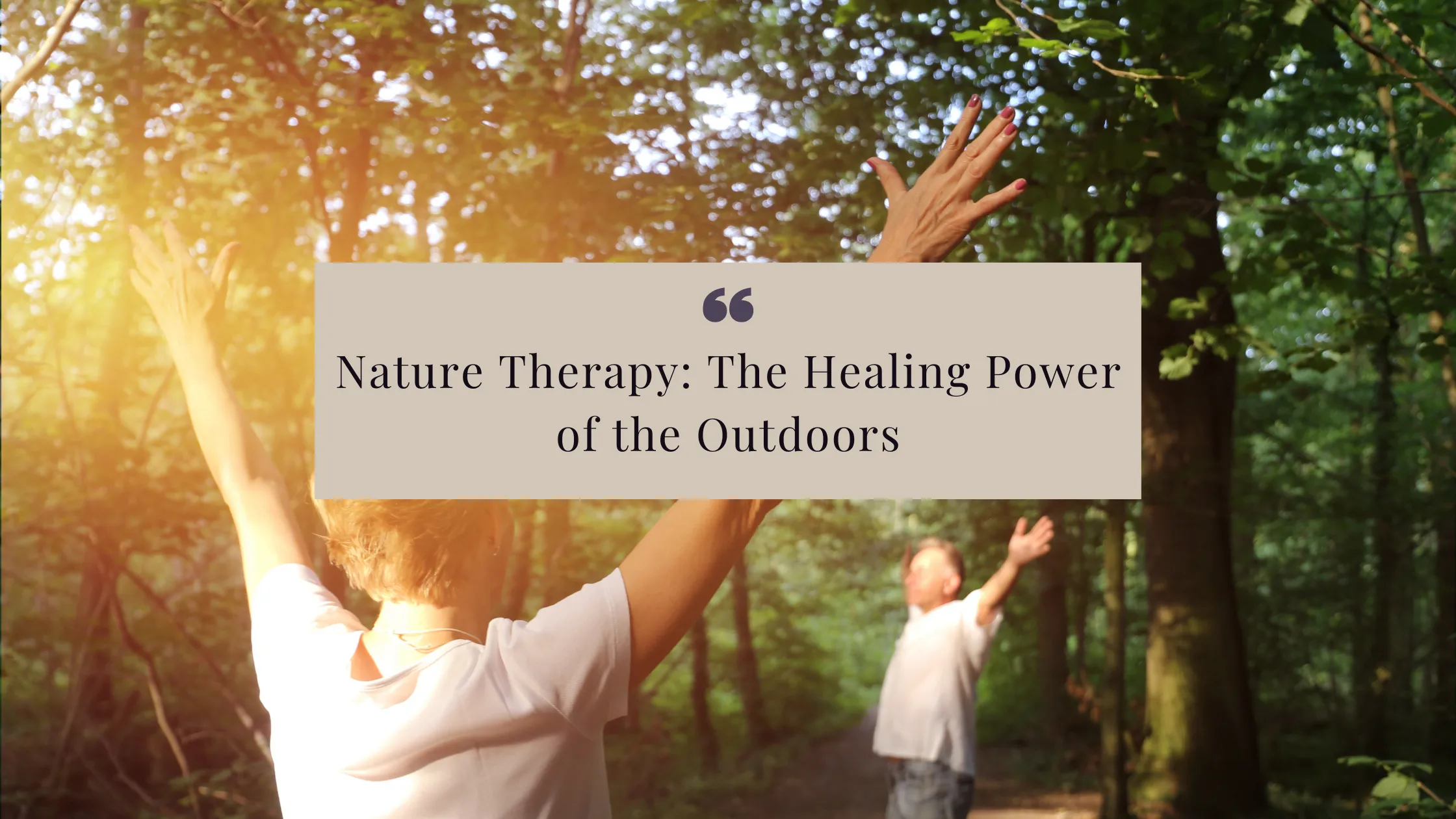
Comprehensive nature therapy techniques to maximize the healing power of outdoor activities.
Creating Your Hiking Schedule
Week 1-2: Foundation
2-3 hikes per week, 30-45 minutes each. Focus on nearby trails and building routine.
Week 3-4: Expansion
Increase duration to 60-90 minutes. Explore new trails and add gentle elevation.
Month 2+: Adventure
Longer hikes, varied terrain, and seasonal trail exploration. Build toward 2-4 hour adventures.
Track your mental health progress alongside your hiking activities to identify patterns and optimize your routine. Note mood levels, energy changes, stress levels, and sleep quality in relation to your hiking schedule. This data helps you understand how hiking for mental health specifically benefits your individual wellness journey and can guide adjustments to frequency, duration, or trail selection.
Consider joining local hiking groups or clubs to add social support to your mental health journey. Many communities offer beginner-friendly group hikes specifically designed for wellness and stress relief. Online platforms like Meetup.com often feature mental health-focused hiking groups that combine outdoor adventure with peer support and shared experiences. For those curious about the physical challenges, our comprehensive guide answers is hiking hard and provides practical advice for overcoming common concerns.
Professional Considerations
While hiking for mental health provides significant benefits, it should complement, not replace, professional mental health treatment. Consult with healthcare providers about incorporating hiking into your overall wellness plan, especially if you're managing clinical depression, anxiety, or other mental health conditions.
Weather considerations play an important role in maintaining consistent hiking routines for mental health. Develop strategies for different seasons and conditions—rain gear for wet weather, appropriate layers for cold conditions, and early morning starts during hot weather. Consistency in your hiking practice maximizes the cumulative mental health benefits, so having weather-adaptive plans ensures you can maintain your routine year-round.
Overcoming Mental Health Challenges on the Trail
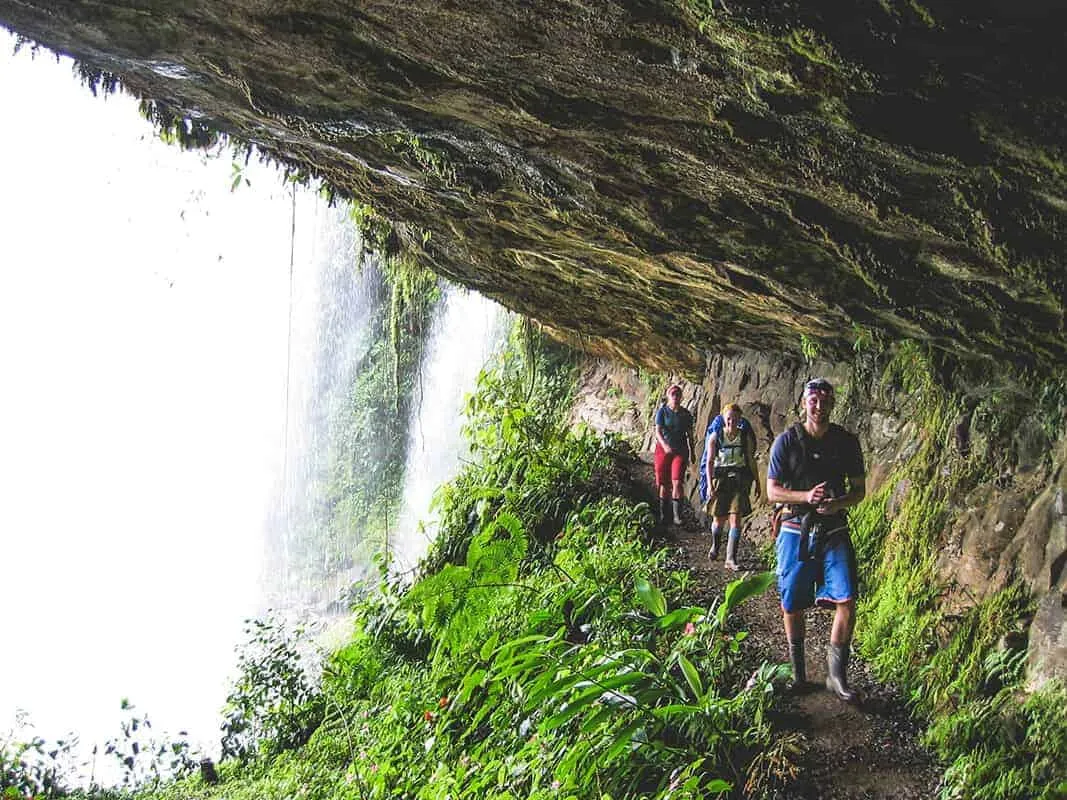
Adventure therapy programs utilize hiking and outdoor activities as therapeutic interventions for mental health treatment.
While hiking for mental health offers tremendous benefits, individuals may encounter various challenges that can be addressed with proper preparation and mindset adjustments. Understanding common obstacles and developing strategies to overcome them ensures that your therapeutic hiking practice remains sustainable and effective over time.
Managing Trail Anxiety
Some individuals experience increased anxiety in unfamiliar outdoor environments. Start with familiar, well-marked trails and consider bringing a trusted companion. Practice grounding techniques like the 5-4-3-2-1 method (5 things you see, 4 things you feel, 3 things you hear, 2 things you smell, 1 thing you taste) to stay present.
- Begin with short, loop trails near parking areas
- Download offline trail maps for security
- Practice deep breathing exercises during breaks
Weather-Related Mood Impact
Seasonal changes can affect both motivation and mood during hiking. Develop strategies for different weather conditions and consider light therapy during darker months. Winter hiking with proper gear can provide unique mental health benefits through increased sunlight exposure and fresh air.
- Invest in weather-appropriate gear
- Adjust hiking times for optimal light exposure
- Embrace different seasonal trail experiences
Low Energy Days
Depression and mental health challenges can reduce motivation for physical activity. On difficult days, modify your hiking goals rather than skipping entirely. Even a 10-minute walk in nature provides benefits and maintains your therapeutic routine.
- Set flexible distance and time goals
- Choose easier trails during challenging periods
- Focus on consistency over intensity
Social Challenges
Social anxiety or self-consciousness about fitness levels can deter some individuals from hiking. Remember that trails welcome people of all abilities and most hikers are supportive and encouraging. Consider online hiking communities for virtual support.
- Start with less crowded trails or off-peak times
- Join beginner-friendly hiking groups
- Remember that everyone started as a beginner
Mindfulness techniques can significantly enhance the mental health benefits of hiking while helping overcome challenges. Practice present-moment awareness by focusing on the rhythm of your footsteps, the sounds of nature, and the sensation of breathing fresh air. When difficult emotions arise during hikes, acknowledge them without judgment and use the natural environment as a grounding anchor.
Building Resilience Through Nature
Regular hiking for mental health builds psychological resilience by providing opportunities to overcome challenges in a supportive natural environment. Each hill climbed, weather condition navigated, and trail completed strengthens your confidence and problem-solving abilities that transfer to daily life challenges.
The metaphorical aspects of hiking—taking one step at a time, persevering through difficult terrain, and reaching beautiful destinations—provide powerful frameworks for approaching mental health recovery and personal growth.
Safety considerations become particularly important when hiking during challenging mental health periods. Always inform someone of your hiking plans, carry emergency communication devices in remote areas, and consider hiking with companions during vulnerable times. Having a safety plan in place allows you to focus on the therapeutic benefits without additional stress or worry. Tracking your progress can also be motivating - learn more about how many calories burned hiking to see the physical benefits alongside your mental health improvements.
Consider developing a personalized "hiking prescription" by working with mental health professionals who understand nature-based therapies. Some therapists specialize in ecotherapy and can help you optimize your hiking for mental health practice by addressing specific challenges, setting appropriate goals, and integrating hiking with other therapeutic interventions for maximum benefit.
Conclusion
The evidence overwhelmingly supports hiking for mental health as a powerful, accessible, and scientifically-backed intervention for improving psychological wellbeing. From reducing cortisol levels and increasing serotonin production to building resilience and fostering social connections, regular hiking provides comprehensive mental health benefits that complement traditional therapeutic approaches.
Your Mental Wellness Journey Starts Today
Whether you're managing stress, anxiety, depression, or simply seeking to enhance your overall mental wellness, the healing power of nature awaits. Start with a single step, choose a nearby trail, and begin experiencing the transformative benefits of hiking for mental health.
Visit our complete mental health hiking guide for more resources, trail recommendations, and community support on your wellness journey.
Remember that hiking for mental health is not a replacement for professional mental health care when needed, but rather a powerful complement to traditional treatments. The combination of physical exercise, natural environment exposure, mindfulness opportunities, and social connection creates a unique therapeutic experience that addresses multiple aspects of mental wellness simultaneously.
As you embark on your hiking journey for mental health, be patient with yourself, celebrate small victories, and trust in the healing power of nature. Every trail offers new opportunities for growth, discovery, and healing. The path to better mental health truly begins with that first step into the natural world.
Continue Your Wellness Journey
Explore our related guides to enhance your outdoor mental health practice:
Take the first step toward better mental health today. Your mind, body, and spirit will thank you for choosing the healing path of nature.


